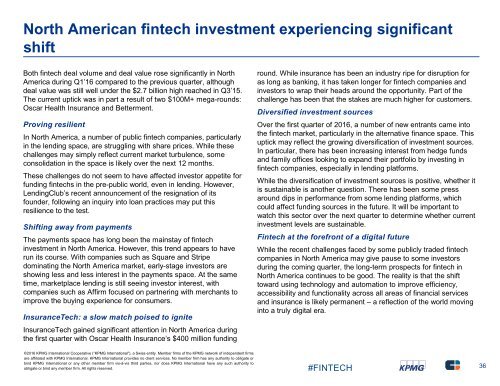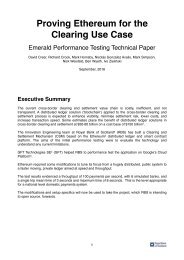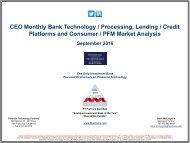of Fintech Q1 2016
25rBQCB
25rBQCB
You also want an ePaper? Increase the reach of your titles
YUMPU automatically turns print PDFs into web optimized ePapers that Google loves.
North American fintech investment experiencing significant<br />
shift<br />
Both fintech deal volume and deal value rose significantly in North<br />
America during <strong>Q1</strong>’16 compared to the previous quarter, although<br />
deal value was still well under the $2.7 billion high reached in Q3’15.<br />
The current uptick was in part a result <strong>of</strong> two $100M+ mega-rounds:<br />
Oscar Health Insurance and Betterment.<br />
Proving resilient<br />
In North America, a number <strong>of</strong> public fintech companies, particularly<br />
in the lending space, are struggling with share prices. While these<br />
challenges may simply reflect current market turbulence, some<br />
consolidation in the space is likely over the next 12 months.<br />
These challenges do not seem to have affected investor appetite for<br />
funding fintechs in the pre-public world, even in lending. However,<br />
LendingClub’s recent announcement <strong>of</strong> the resignation <strong>of</strong> its<br />
founder, following an inquiry into loan practices may put this<br />
resilience to the test.<br />
Shifting away from payments<br />
The payments space has long been the mainstay <strong>of</strong> fintech<br />
investment in North America. However, this trend appears to have<br />
run its course. With companies such as Square and Stripe<br />
dominating the North America market, early-stage investors are<br />
showing less and less interest in the payments space. At the same<br />
time, marketplace lending is still seeing investor interest, with<br />
companies such as Affirm focused on partnering with merchants to<br />
improve the buying experience for consumers.<br />
InsuranceTech: a slow match poised to ignite<br />
InsuranceTech gained significant attention in North America during<br />
the first quarter with Oscar Health Insurance’s $400 million funding<br />
©<strong>2016</strong> KPMG International Cooperative (“KPMG International”), a Swiss entity. Member firms <strong>of</strong> the KPMG network <strong>of</strong> independent firms<br />
are affiliated with KPMG International. KPMG International provides no client services. No member firm has any authority to obligate or<br />
bind KPMG International or any other member firm vis-à-vis third parties, nor does KPMG International have any such authority to<br />
obligate or bind any member firm. All rights reserved.<br />
round. While insurance has been an industry ripe for disruption for<br />
as long as banking, it has taken longer for fintech companies and<br />
investors to wrap their heads around the opportunity. Part <strong>of</strong> the<br />
challenge has been that the stakes are much higher for customers.<br />
Diversified investment sources<br />
Over the first quarter <strong>of</strong> <strong>2016</strong>, a number <strong>of</strong> new entrants came into<br />
the fintech market, particularly in the alternative finance space. This<br />
uptick may reflect the growing diversification <strong>of</strong> investment sources.<br />
In particular, there has been increasing interest from hedge funds<br />
and family <strong>of</strong>fices looking to expand their portfolio by investing in<br />
fintech companies, especially in lending platforms.<br />
While the diversification <strong>of</strong> investment sources is positive, whether it<br />
is sustainable is another question. There has been some press<br />
around dips in performance from some lending platforms, which<br />
could affect funding sources in the future. It will be important to<br />
watch this sector over the next quarter to determine whether current<br />
investment levels are sustainable.<br />
<strong>Fintech</strong> at the forefront <strong>of</strong> a digital future<br />
While the recent challenges faced by some publicly traded fintech<br />
companies in North America may give pause to some investors<br />
during the coming quarter, the long-term prospects for fintech in<br />
North America continues to be good. The reality is that the shift<br />
toward using technology and automation to improve efficiency,<br />
accessibility and functionality across all areas <strong>of</strong> financial services<br />
and insurance is likely permanent – a reflection <strong>of</strong> the world moving<br />
into a truly digital era.<br />
#FINTECH<br />
36









